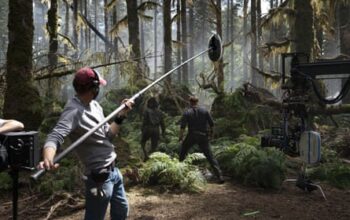W
How can one even begin to prepare for an interview with Rob Reiner? Perhaps by rewatching his iconic films, especially the impressive eight-year period from 1984’s This Is Spinal Tap to 1992’s A Few Good Men. But even that only scratches the surface of his extensive career, which dates back to the late 1960s. What about his time as a popular household name in 1970s sitcoms, or his father’s fame as a comic actor, or his unique upbringing surrounded by entertainment legends like Mel Brooks? And let’s not forget Reiner’s activism, including his important contributions to overturning California’s ban on same-sex marriage and using cigarette taxes to support programs for children and prenatal care.
And, what can we say about the projects he’s currently working on? At 76 years old, Reiner doesn’t seem to be slowing down. He’s working on a sequel to Spinal Tap and speaking to me today about a documentary he’s involved in that sheds light on the rise of Christian nationalism in America. The film, titled God and Country, is a chilling yet necessary watch as it delves into a movement that has infiltrated both American politics and the Republican party. To Reiner, this could be a threat to democracy in the US, and potentially, the rest of the world. Is he truly serious about this?
When asked over a video call from New Orleans, he confidently responds, “The upcoming election presents us with a crucial decision: do we wish to uphold 249 years of self-governance and the values of American democracy? Or do we want to hand over power to someone like Donald Trump, who openly declares his desire to dismantle the constitutional system, target his opponents, and establish an autocratic rule in America? Autocracy is gaining ground globally, and if we falter, the threat of democracy collapsing elsewhere becomes a reality.”
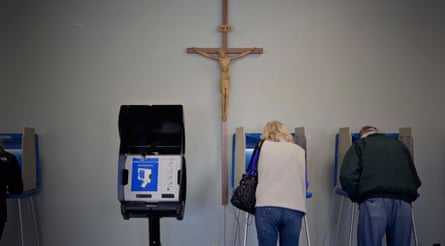
Beginning in the 1970s, the Christian nationalist movement gained momentum by focusing on abortion as a central issue. Initially, evangelicals were not highly political and remained supportive of the separation of church and state outlined in the US constitution. However, through significant funding and effective organization, abortion became a key religious issue and the belief emerged that democracy itself was an obstacle to God’s plans. As shown in the documentary, this resulted in churches becoming political entities, pastors inciting hatred towards Democrats, and reports of ministers carrying firearms during sermons. On January 6, 2021, this stirring of violence reached its peak when Donald Trump’s supporters breached the Capitol building in Washington DC.
Reiner states that Christian nationalism was the driving force behind it all. He believes that Donald Trump provided a platform for individuals to channel their beliefs through.
The paradox of this situation is that despite his claims, Trump is not the type of person one would typically associate with Christianity. Reiner agrees that while he may be able to spell “bible,” it’s doubtful that he has ever truly read or understood its contents. However, excuses are made in the belief that God has a plan, even if it involves using a flawed individual to achieve their desired outcomes.
Reiner has remained a strong advocate for Biden in the 2020 election, despite criticism about the current president’s advanced age. Even though he will be almost 82 years old in November, Reiner’s loyalty to Biden remains unwavering.
Reiner, despite his visible fury, maintains a humorous tone as he comments, “Wow, he’s really been around a while!” He observes that one individual may be clumsy, but another is a habitual liar and has faced a whopping 91 indictments in his lifetime.

Reiner and his father both harbored a strong animosity towards Trump. His father, who longed to witness Trump’s defeat in the 2020 election, passed away at the age of 98 just a few months before it took place. “The person he despised ultimately emerged victorious,” states Reiner. “But I don’t think he could have ever imagined Trump making a comeback. It’s like dealing with a zombie or cockroach.”
The Reiner family were strong supporters of liberal politics. In the 1950s, the FBI visited their home to question Carl about his acquaintance with members of the Communist party. His response was: “I may know some, but I wouldn’t tell you if I did.” Estelle Reiner, who passed away in 2008, was involved in organizing for Another Mother for Peace, a group against the Vietnam war. The Reiners were also heavily involved in the civil rights movement, and the death of civil rights activist Medgar Evers in June 1963 held a significant impact on them.
He was greatly influenced by them, leading to Reiner creating the film Ghosts of Mississippi in 1996, which focused on the trial of the individual who killed Evers. Presently, due to his privileged background, Reiner may have been criticized for being a “nepo baby”. This may seem strange given his age of 76, but he handles it gracefully.
“If you have connections, opportunities will arise,” he stated. “However, you must deliver. If you fail to deliver, the opportunity will disappear as quickly as it appeared.”

According to Reiner, his children are currently facing this issue. His son is 32 years old and his daughter is 26 years old.They both have aspirations for their careers and are both very skilled. However, they are unsure whether they should pursue it or step back. Reiner advised them that once they find their own path, these doubts won’t matter. He was aware during his own career that he did not want to rely on his father. He did not ask for financial support and strongly believes that if one’s intentions are genuine, they can block out any outside influences.
Reiner frequently expresses affection towards his father in conversation, but their relationship was not always smooth. I mention how the main characters in Reiner’s films often struggle with similar relationships – Lieutenant Daniel Kaffee in A Few Good Men was haunted by his father’s powerful reputation, while Gordie in Stand By Me felt overlooked and misunderstood by his own father. Reiner acknowledges this observation, stating, “I loved my father and he loved me, but as a child, I don’t think he understood me. To him, I was different and he struggled to connect with me. This aspect is reflected in my films, especially Stand By Me.”
When Reiner was eight years old, the late Norman Lear, a family friend and renowned sitcom writer, complimented Carl on how funny his son was. However, Carl’s response was apparently, “That kid? I don’t know. He’s a moody child.” Another actor, Martin Landau, once shared that Carl had expressed doubt about Rob’s desire to pursue acting by saying, “Robbie wants to be an actor, and I’m not sure if he can do it.” This statement from Carl seemed to hold true when Rob auditioned for the lead role in his father’s semi-autobiographical movie, Enter Laughing, in 1967, but was ultimately not cast by Carl himself. Rob, who was 19 at the time, reflects, “He rejected me. It was a difficult time for me.”
After watching 19-year-old Rob take on the direction of Jean-Paul Sartre’s play No Exit, Carl finally understood that his son was headed in the right direction. The following day, Rob reassured his father in the backyard, saying, “I am not concerned about you.” So it was evident that prior to this moment, he had some concerns.
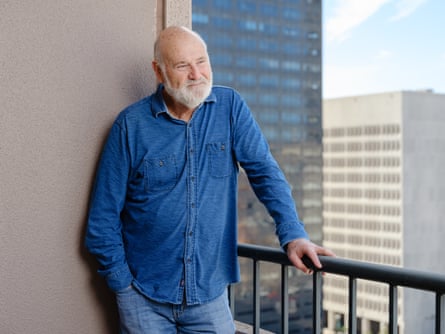
You have the option to view the image in fullscreen instead of its original size.
Reiner is following in his father’s footsteps and shows no signs of retiring soon. He is currently in New Orleans to begin production on the sequel to Spinal Tap. The new film will showcase the band’s reunion for a final concert at the Lakefront Arena in New Orleans, 40 years after their iconic albums and infamous Stonehenge incident. However, the band members must overcome their strained relationship in order to make the reunion happen.
At the time of its release, Reiner was not well-known as a director. Some audience members did not initially recognize the satirical elements of the film and questioned why he had created a feature-length movie about an unpopular band. However, the upcoming sequel will be different with well-known musicians like Paul McCartney, Elton John, and Garth Brooks set to make guest appearances. Trying to follow up a beloved cult classic is a daunting task and Reiner acknowledges that everyone involved is feeling the weight of expectations.
“It’s quite stressful,” he stated. “Many people would encourage us to make another one. We were hesitant, but we eventually thought of a concept we believe will be successful. Hopefully, it will be humorous, as the expectations are quite high.”
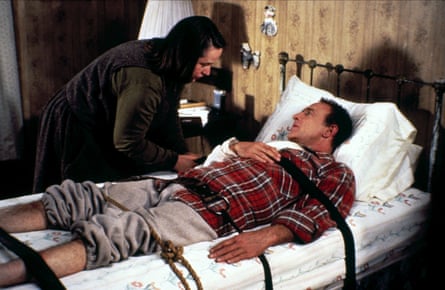
Just like the original, the conversation will be entirely spontaneous – but he wouldn’t actually put Sir Paul in the high-pressure situation of improvisation, right?
“Yes, that’s me!” he says with a smile. “I advised him not to be concerned and just speak naturally, and no matter what happens, we’ll continue on indefinitely. I won’t use the entire thing, just whatever works.”
Tap’s impact can be seen in various aspects of popular culture today. Reiner remembers an event where Elon Musk arrived in his first electric car and invited him to sit inside. Musk then turned up the radio volume to its highest level (which was 11) – an action that Reiner appreciates. However, there are other actions of Musk that Reiner does not approve of.
After working on other projects for many years, Reiner has no trouble sharing stories about the movies he made several decades ago. For example, the unbearable tension on the set of Misery was even worse than expected. Jimmy Caan, known for his physicality as a baseball player and rodeo rider, had to spend most of his time in bed for the role. Meanwhile, Kathy Bates, a stage-trained actress, wanted more and more rehearsals, while Jimmy preferred to do none. During the filming of the hairpin unlocking and wheelchair scene in the hallway, even though they only moved a few feet, it felt like releasing kids for recess.
He is happy with the amount of people who enjoy his films, but he doesn’t take compliments or critiques too seriously. At a social gathering, former Supreme Court Justice Anthony Kennedy approached him and declared, “All courtroom dramas are terrible, awful… except for A Few Good Men… and My Cousin Vinny!” He chuckles at this and explains, “He mentioned my film before comparing it to My Cousin Vinny, so other people’s opinions don’t hold much weight!”
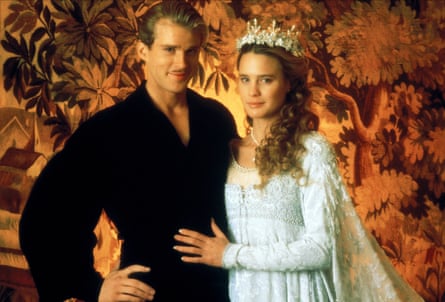
–
Display the image in full screen mode.
Reiner can’t pinpoint any reason why his films have stood the test of time. But he especially loves the reactions he gets to The Princess Bride, his revisionist fairytale from 1987. “People come up and say: ‘I saw it when I was six, and now I show it to my kid.’ That makes me feel good.”
Similar to Spinal Tap, the movie took some time to gain momentum, but Reiner remains optimistic that God and Country will resonate with audiences right away. “We must reach a wide audience before the election,” he explains. However, he questions whether evangelicals will be drawn to the film even if he is successful.
Reiner acknowledges that this is not geared towards hardcore individuals. Instead, they are aiming to connect with other Christians who may have unintentionally become involved. This is why they include discussions with highly conservative Christian intellectuals, such as Russell D Moore, who raise questions about whether these ideas align with the teachings of Jesus. Many of these individuals see Christian nationalism as a danger to the Christian faith.
All Reiner wants is for those watching to think of the none-more-Christian phrase – Do unto others as you would have them do unto you – and ask themselves if they’re truly living up to it? “Because, as my father used to say: follow that, and you don’t even need the Ten Commandments. That covers everything.”
Source: theguardian.com

